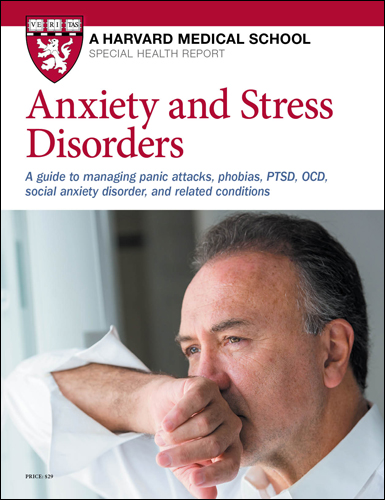Harvard Health Blog
Coping with the coronavirus pandemic for people with anxiety disorders

These days, we all have to accept the anxiety inherent in living in the time of the coronavirus pandemic and COVID-19. If there was a way to dispel all anxious feelings, I’d tell you, but there isn’t. The one exception might be someone who could summon such a degree of denial that they carry on as if everything was normal. And that, as I’m sure you can see, would prove to be very, very unwise.
Anxiety helps us prepare to respond in a more adaptive and healthy way. Some people find it possible to tolerate some degree of discomfort and can manage their anxiety in a healthy manner. Often that’s because some people have done well under this kind of challenge already, albeit in very different contexts. Life has a way of requiring this. Yet other people — particularly people who have anxiety disorders — may understandably be having a great deal of trouble coping.
How can I cope with the coronavirus outbreak if I have a pre-existing anxiety disorder?
Anxiety disorders take many forms and affect many people. So, what happens now if you’re someone who has suffered way too much already with a pre-existing anxiety disorder? For example, perhaps you have been, or could be, diagnosed with panic disorder, post-traumatic stress disorder (PTSD), or obsessive-compulsive disorder (OCD). Hopefully, you may find that the tips below will help you cope more successfully with what we are all facing together in these unprecedented times.
Seek support from a mental health professional
Talking to a mental health professional can bolster your ability to address present concerns, and help you clarify where your feelings are coming from, as explained below. When you’re feeling extra worried or overwhelmed, it could be that some of your feelings are from the present challenge and some are from challenges you have faced in the past.
Many psychotherapists and health plans are offering telehealth visits during this time. Ask your therapist or insurance plan if this is an option. More therapists than ever before are moving their practices online. If you search for therapists in your area, their websites may tell you whether they participate in telehealth. Additionally, some national telehealth apps offer therapy via video or audio chat.
Work toward separating out where your feelings are coming from
Doing this work can allow you to take a breath and divvy up the different emotional contributions that feed how you’re feeling.
- Try saying this, for example: “Of course, I’m more concerned than (my roommate/my friend/my family), because I’m practiced at feeling anxious or helpless.”
- The next step is to recognize that the percentage of feelings that stem from the past do not have to govern how you necessarily feel in the present. Try saying this out loud: “Well that was then, this is now.” A simple statement like this can actually open the door to some significant relief.
- Gently remind yourself of this crucial separation, cleaving the past from the present. And kindly and reassuringly remind yourself that you have the resources — both internal and external — to manage your feelings and reactions in the now. This is crucially important.
Keep providing yourself with guidance
As often as you need to hear it, tell yourself the following: “I can manage. I can practice what I know to be helpful, and I know that in managing my feelings and reactions I can seek support from a few close friends. Further, I can seek the support of a mental health professional when needed. By combining these strategies, I will be able to settle my nerves in order to be able to make healthy choices.”
This kind of mantra bears repeating over and over. This is not “fake it till you make it.” This is believing in yourself and believing in a course of action that you can set in motion. Try to believe that, together with supportive others, this self-guidance and this plan will work for you. Know that in many instances, people who have known tremendous adversity and even trauma are able to demonstrate a strength forged from those circumstances. This is entirely consistent with human abilities.
Drawing on what you’ve learned can help you cope
We are wired for fight or flight. But as a colleague of mine noted, the present situation does not require either of these. If you’re a human who’s been challenged, or somewhat disabled, by anxiety in the past, I encourage you now to draw upon what you’ve learned in terms of how you can manage successfully.
Separating out feelings from the past, reminding yourself that you have the strength and ability in the present to prevail, seeing a path forward for yourself and setting yourself upon that path is the way forward. If along that way you should stumble and fall, picture yourself as able to pick yourself back up and carry on. Reassure yourself that the basic provisions for your safety and well-being are within your power to meet. In my book, every day that you are able to do so, counts as a very good day indeed.
About the Author

John Sharp, MD, Contributor
Disclaimer:
As a service to our readers, Harvard Health Publishing provides access to our library of archived content. Please note the date of last review or update on all articles.
No content on this site, regardless of date, should ever be used as a substitute for direct medical advice from your doctor or other qualified clinician.
















